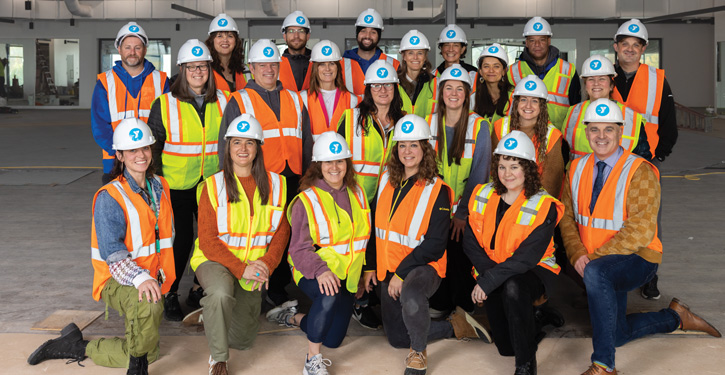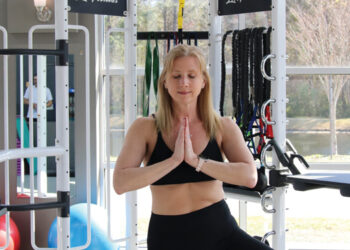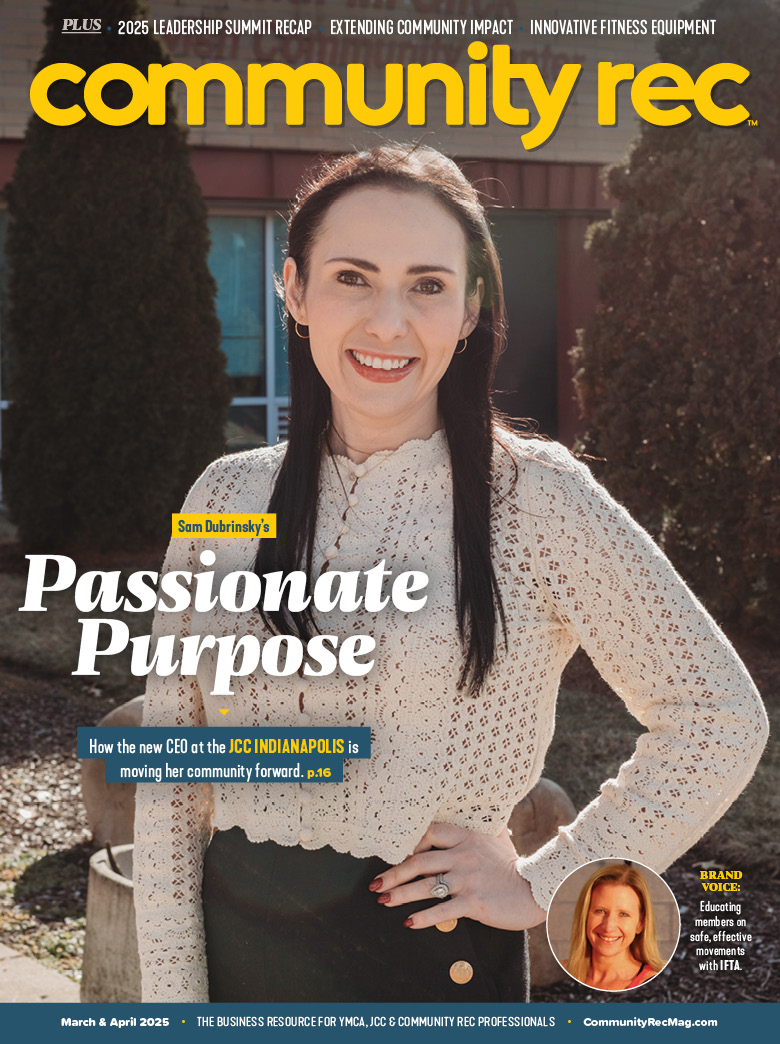How continuous hope powers Brian Steffen and the Eugene Family YMCA.
When Brian Steffen was named the new CEO of the Eugene Family YMCA in 2018, he joined an organization with a huge dream.
For over 136 years, the Y has served the Eugene, Oregon, community by embodying a DNA-deep commitment to innovating, evolving and expanding services. This mission was further exemplified when a capital campaign for a new central facility began in 2014. The project was massive in scope. Over $4 million was raised in the four years leading to Steffen’s arrival.
Fast forward to the start of 2024 and the community is currently enjoying its new state-of-the-art rec center after the capital campaign raised an estimated $48 million, making the facility one of the most expensive in the history of the national YMCA organization.
Despite numerous obstacles which included a devastating global pandemic, Steffen said the lofty ambitions of the Y became a reality mostly due to a simple, pertinent factor: hope.
“It wasn’t an uncommon refrain when I joined that people said, ‘Will it ever happen? It’s been in the works for years.’ So, we had to shift that mindset for individuals to understand of course it will happen,” said Steffen. “The reason it will is because the need is so compelling. One of the things I’m so proud of our team for is never allowing that flame of hope to fade out, even during COVID-19 when there were a lot of challenges. That hope remained bright.”
Humble Beginnings
Steffen grew up on a cattle ranch in Montana with the nearest YMCA being over three hours away. He knew nothing about the organization’s mission other than what he imagined when he heard the Village People’s famous song.
But thanks to his time in the nonprofit industry, he eventually interacted with YMCA leaders and learned about their work. He then began looking for an opportunity within the movement and on January 1, 2016, was named CEO of the Missoula Family YMCA.
Not too long after, Steffen met Julie Grossman who was the CEO of the Eugene Family YMCA at that time. “I was excited to hear about the capital campaign they had started and the impact their Y was having in Oregon,” said Steffen. “My grandparents lived in Eugene in the 1940s and it was a community I loved. When Julie returned to her hometown YMCA in Wisconsin, I eagerly jumped at the opportunity to join a YMCA I already had a high degree of respect and admiration for.”
Transitioning to a new leader while in the middle of a major fundraising initiative was not an ideal situation for the YMCA — not to mention hiring a relative outsider from the Eugene community. As such, Sabrina Parsons, the chair of the Eugene Family YMCA’s capital campaign, said the transition from Grossman to a new CEO was a moment that could’ve gone either way for the future of the Y in a tight-knit community.
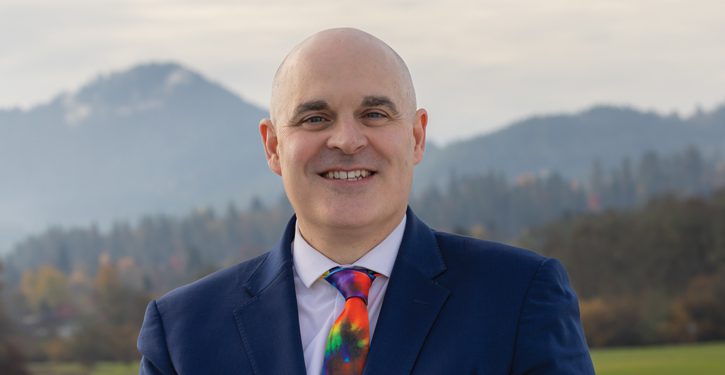
“Bringing in a new CEO when you’re trying to raise a lot of money is always dicey,” said Parsons. “Eugene is a very interesting community and very unlike other places I’ve lived. Everybody knows each other. Families have lived here for a long time, and people can be wary of outsiders. I was afraid of what would happen with the Y and the capital campaign if you bring in someone who’s not from Eugene. There have been other organizations and nonprofits who brought in outside CEOs, and it hasn’t gone well.”
However, Parsons said those concerns were quickly erased after Steffen’s arrival. He had a clear understanding of the importance of creating relationships in the community.
In fact, Steffen said during his first year at the Y, he had lunch or breakfast with around 200 different individuals native to Eugene from a variety of different socioeconomic backgrounds and political ideologies.
“Repeatedly, despite an individual’s unique perspectives, they were all very invested in helping our community thrive and grow and meet the needs of today’s youth,” said Steffen. “It was really a wonderful experience. Eugene is a lot larger than the community I grew up in, but it’s also a community that takes a lot of pride in the authenticity of its relationships and people being their genuine self.”
Overcoming Adversity
Thanks in part to Steffen’s leadership, the campaign for a new facility was on track in the spring of 2020. However, like the rest of the world, it came to a screeching halt when the COVID-19 pandemic struck.
Joe Carmichael, the Eugene Family YMCA’s board president, said they responded to the situation by shifting the focus of the Y away from the campaign to assisting the community through the difficult time. This helped bring exposure to the organization’s mission and the capital campaign.
With schools shut down, Carmichael said the Y immediately pivoted to offering emergency childcare to frontline workers. For the entire next academic year, the Y provided a safe, engaging place for students to attend school online.
“We stopped asking the question of how we stay in business, and we went to the question of how do we help people?” said Carmichael. “It was all hands-on deck. COVID-19 was a massive negative impact to our community, but it allowed us to engage with people we hadn’t previously engaged with. It really allowed us to shine a light on what we do, which is help people. We worked tirelessly and put ourselves on the line. What could have killed our campaign ended up being one of the major drivers of success for it.”
Another obstacle Carmichael noted was the Y hoped to get anywhere from $5 to $12 million in new market tax credits for the facility. In fact, every board meeting for nearly three years included discussions on the topic. But in the end, the Y got nothing from the idea.
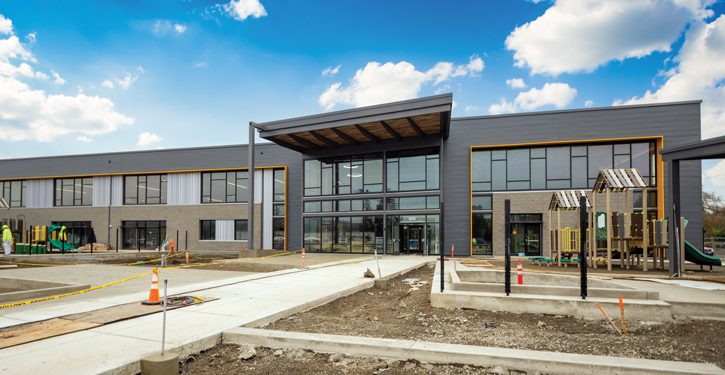
“It didn’t yield any results, but it still allowed us to engage with different people on different ideas,” said Carmichael. “I don’t regret doing it. You must be resilient. It’s hard not to get frustrated and quit and move on to something else. We weren’t afraid to tell and live our story. That was what got us through that period.”
This never-give-up-mindset was again showcased through the Y’s efforts to secure a large chunk of funding through the state of Oregon as part of the government’s lottery revenue allocation. Carmichael said this process is extremely competitive as dozens of nonprofit groups lobby for the money.
To meet the challenge, Carmichael said Steffen would go to the state capital every week and bring board members to meet and engage with members of the legislature. The effort was successful, and the Y received $15 million from the state for the new facility.
“We were one of the largest allocations from the state, which was accomplished because of Brian being just an incredibly relentless, driven individual,” said Carmichael. “He stood in the capital halls and anytime someone’s walking by he got 30 seconds with them. He’s remarkable. I don’t have enough positive things to say about him. If you were to select the qualities of a strong leader, Brian has virtually every one of them in spades. I think our capital campaign could have been a case study for how to derail a project between COVID-19 and having multiple CEOs. Brian has an incredible work ethic driven by an authentic desire to help people. Those are things you can’t fake.”
Steffen said the allocation from the state proved to be even more beneficial as it further motivated the community’s confidence behind the massive project.
“Because of how competitive and how thoroughly vetted that funding is, it immediately inspired hope and confidence from a wide spectrum of other philanthropists,” said Steffen. “The key was first building hope and following that with a relentless determination to find solutions on the funding stack. And because of that, we’ve been able to have incredible success with fundraising.”
A Dream Fulfilled
After nearly a decade of planning and hard work, the doors of the new Eugene Family YMCA finally opened to the community in December 2023. The new Y is now located directly next to one of the largest middle schools in Eugene, less than two blocks away from a high school and close by a new youth sports facility.
Parsons said this new location helps the Y be an anchor for a lot of nearby kids and their families in the community for years to come.
“I’ve lived in Eugene for about 20 years now,” said Parsons. “Over the last 10 years, we’ve had a lot of employees who moved from other places. Part of wooing them to come here usually includes those who have kids and ask about childcare solutions. People use the Y for daycare, swimming lessons and summer camps. It’s something I think is critical and important to the community.”
At 75,000 square feet, the new Y is nearly double the size of the old facility, is made to the highest possible seismic standards, is fully ADA accessible and is designed to minimize its carbon footprint, with CO2 emissions equal to 1.25 U.S. households. Other new features include a STEM lab for children, a teaching kitchen, and an expanded aquatics area featuring a spray pad and a warm water small pool.
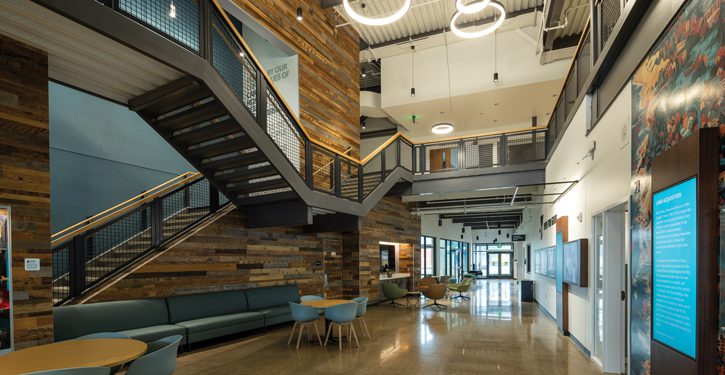
However, Carmichael said the most exciting prospect of the new facility is the programming that will happen in the spaces yet to be filled. “Our smallest room for any of our activities is larger than the biggest room at the former Y,” he said. “We have significantly more space. We’ve just had an eye toward helping our community, engaging with people in finding out what’s important to them and trying to get as much of that into the building as we can.”
Steffen said the new Y would not be a reality without the level of trust that exists within the organization.
“Most of our program directors have been with our Y for over 20 years,” said Steffen. “We have many board members who have been in their positions for 15-plus years. As new people have joined our Y, that authentic belief in others has remained strong. We spend a lot of time focusing on our culture and focusing on how we want to show up for one another. Because of that, we can dream audaciously and shoot for the stars.”
Constantly Improving
The success of the capital campaign and the opening of the new Y are already doing wonders in the mid-sized Pacific Northwest community. However, Steffen insists the work of his organization is only beginning. As new goals and plans are passed to specific departments at the Y, Steffen said the staff leans into the metaphor of a track team.
“It’s an impossibility to expect any one person to always be resilient, to never lose hope and to have unfailing energy,” said Steffen. “It’s kind of like a relay team where somebody is exhausting themselves and then you’re able to hand the baton off to somebody else. We’re now handing the baton off to people like our communications team and our program directors who are imagining how to enliven the spaces. We’re not expecting perfection, but we’re relentlessly focusing on progress.”
Moving forward, Carmichael said the Y has already sent a questionnaire to around 150 different organizations and nonprofits they formerly partnered with, asking how the Y can assist them in the future.
While helping that many groups may sound like a tall task, Carmichael is more than confident in the ability of Steffen and his staff.
“When it comes to a board having faith in its CEO, I don’t think we could have more of it,” said Carmichael. “It feels like we’re just along for the ride. I think the staff has done such amazing work. They all share the same never-quit, positive attitude. Getting to be around Brian and our staff and seeing how dedicated they are is contagious. I hope more people are exposed to the work that’s happening here.”
For Steffen, his organization’s growth and success isn’t about any one individual. Instead, the focus is on continuing to be stewards of the impact the Y has made in Eugene for the past 136 years.
“People will look back on a project of this magnitude,” said Steffen. “It’s going to have a transformative impact for our community. The building will remain, but the legacy of learning new skills on your own and developing confidence in your team will change lives for years to come.”


